Summer reading 2009
Jul 18th, 2009 by MESH
 Summer is upon us, and MESH has asked its members to recommend books for summer reading. (For more information on a book, or to place an order with Amazon through the MESH bookstore, click on the book title or cover.) And now that you have other reading, MESH takes our first vacation since we launched back in December 2007. Action will resume on August 10.
Summer is upon us, and MESH has asked its members to recommend books for summer reading. (For more information on a book, or to place an order with Amazon through the MESH bookstore, click on the book title or cover.) And now that you have other reading, MESH takes our first vacation since we launched back in December 2007. Action will resume on August 10.
 Daniel Byman :: Kill Khalid by Australian journalist Paul McGeough (New Press, 2009) offers a riveting account of the bungled Israeli assassination attempt against Khalid Mishal in Amman in 1997. McGeough also explores the rise of Hamas and the emergence of Mishal as one of its leaders. Kill Khalid is extremely readable and draws heavily on interviews of many of the key figures. McGeough also provides an interesting account of Hamas after its victory over Fatah in elections in 2006. I would have liked more on Hamas’ rise inside the West Bank and Gaza before 2006, and the focus on Mishal means that several other key players do not receive enough attention. But these criticisms are simply a desire to have an already long book be even longer. McGeough’s occasional sympathy for Hamas will annoy some readers, but it would be a shame if this turns them off the book completely, as he offers plenty of interesting stories and provocative thoughts about a group that is not well understood in the United States.
Daniel Byman :: Kill Khalid by Australian journalist Paul McGeough (New Press, 2009) offers a riveting account of the bungled Israeli assassination attempt against Khalid Mishal in Amman in 1997. McGeough also explores the rise of Hamas and the emergence of Mishal as one of its leaders. Kill Khalid is extremely readable and draws heavily on interviews of many of the key figures. McGeough also provides an interesting account of Hamas after its victory over Fatah in elections in 2006. I would have liked more on Hamas’ rise inside the West Bank and Gaza before 2006, and the focus on Mishal means that several other key players do not receive enough attention. But these criticisms are simply a desire to have an already long book be even longer. McGeough’s occasional sympathy for Hamas will annoy some readers, but it would be a shame if this turns them off the book completely, as he offers plenty of interesting stories and provocative thoughts about a group that is not well understood in the United States.
.
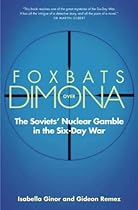 Mark T. Clark :: Isabella Ginor and Gideon Remez propose a provocative thesis in their book, Foxbats over Dimona: The Soviets’ Nuclear Gamble in the Six-Day War (Yale University Press, 2007). They propose that, contrary to conventional historiography, the Soviets provoked the 1967 Six-Day War between Israel and Egypt in order to destroy Israel’s nascent nuclear program. The conventional wisdom holds that while the Soviets may have carelessly provoked the war (by baselessly charging the Israelis with preparing for war against Syria and Egypt), they nonetheless acted to constrain their Arab clients once war began. Ginor and Remez demonstrate conclusively that this interpretation has more to do with holding to certain assumptions than in attending to all the details that have become available through careful research, interviews, some archival work, and unintended admissions by Soviet officials and participants in the war. The authors are continuing their research beyond the book and will present their latest findings at ASMEA’s annual conference in October 2009. But you will have to read this book first.
Mark T. Clark :: Isabella Ginor and Gideon Remez propose a provocative thesis in their book, Foxbats over Dimona: The Soviets’ Nuclear Gamble in the Six-Day War (Yale University Press, 2007). They propose that, contrary to conventional historiography, the Soviets provoked the 1967 Six-Day War between Israel and Egypt in order to destroy Israel’s nascent nuclear program. The conventional wisdom holds that while the Soviets may have carelessly provoked the war (by baselessly charging the Israelis with preparing for war against Syria and Egypt), they nonetheless acted to constrain their Arab clients once war began. Ginor and Remez demonstrate conclusively that this interpretation has more to do with holding to certain assumptions than in attending to all the details that have become available through careful research, interviews, some archival work, and unintended admissions by Soviet officials and participants in the war. The authors are continuing their research beyond the book and will present their latest findings at ASMEA’s annual conference in October 2009. But you will have to read this book first.
.
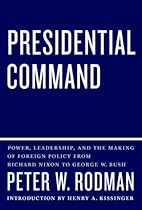 Michael Doran :: My favorite recent book on the Middle East is not on the Middle East at all: Peter Rodman, Presidential Command (Knopf, 2009). Although it is a study of U.S. national security policy making, it is highly relevant to students of the Middle East, not least because it presents an original interpretation of Bush 43’s Middle East policies—one that is considerably at odds with the reigning narrative. Let me revise that last sentence: “an original and critical interpretation….” Rodman was no cheerleader. The entire book is rewarding, but, if nothing else, read the Bush 43 chapter—personally, I found it riveting. Fair warning: the book does have a dispassionate, academic quality that makes it less than ideal as fun, beach entertainment. It is, however, essential reading. Rodman, who was a member of MESH, died unexpectedly last year. He was a special man. In his honor, be sure to read the eulogy by Kissinger at the beginning.
Michael Doran :: My favorite recent book on the Middle East is not on the Middle East at all: Peter Rodman, Presidential Command (Knopf, 2009). Although it is a study of U.S. national security policy making, it is highly relevant to students of the Middle East, not least because it presents an original interpretation of Bush 43’s Middle East policies—one that is considerably at odds with the reigning narrative. Let me revise that last sentence: “an original and critical interpretation….” Rodman was no cheerleader. The entire book is rewarding, but, if nothing else, read the Bush 43 chapter—personally, I found it riveting. Fair warning: the book does have a dispassionate, academic quality that makes it less than ideal as fun, beach entertainment. It is, however, essential reading. Rodman, who was a member of MESH, died unexpectedly last year. He was a special man. In his honor, be sure to read the eulogy by Kissinger at the beginning.
.
 Adam Garfinkle :: Lawrence Rosen, a Princeton anthropologist (also a lawyer and an early MacArthur “genius” awardee), has a “big idea” in his newest book, Varieties of Muslim Experience (University of Chicago Press, 2008). The idea concerns the intensely personal, relational nature of what he calls Islamo-Arab society. The metaphor that holds it all together is that of the arabesque. Rosen tries to illustrate the workings of this big idea with regard to politics, law, science, terrorism, portraiture, how we understand Ibn Khaldun, and more.
Adam Garfinkle :: Lawrence Rosen, a Princeton anthropologist (also a lawyer and an early MacArthur “genius” awardee), has a “big idea” in his newest book, Varieties of Muslim Experience (University of Chicago Press, 2008). The idea concerns the intensely personal, relational nature of what he calls Islamo-Arab society. The metaphor that holds it all together is that of the arabesque. Rosen tries to illustrate the workings of this big idea with regard to politics, law, science, terrorism, portraiture, how we understand Ibn Khaldun, and more.
Some of these applications have appeared in Rosen’s earlier work, and some of his attempts at interpreting the big idea are more persuasive (to me, anyway) than others. Still, despite the occasional repetition and the density of the some of the writing, this is worth a look. If you take a social anthropological approach to the Middle East as the beginning of wisdom, as I have done now for several decades, you will have more patience for Rosen’s kind of writing and way of thinking than if you have limited yourself to IR/poli-sci-fi kinds of writing. So this book is not for everyone, but it is stimulating. It provides new ways to support arguments some of us make on related but different grounds (about the fit between Arab political culture and political pluralism, for example). Above all, perhaps, it really does traffic in a big idea, which, for anthropologists these days, if not for other social scientists, is depressingly rare.
Ah, but will it hold your attention at the beach or at poolside? If you’re worried it might not, maybe bring along Tom Robbins’ new one, B is for Beer, just in case.
.
 Michael Horowitz :: Assaf Moghadam’s book, The Globalization of Martyrdom: Al Qaeda, Salafi Jihad, and the Diffusion of Suicide Attacks (Johns Hopkins University Press, 2008), is an excellent read. Moghadam is a leading expert in the study of Al Qaeda and suicide attacks and his expertise shines through. He discusses the rise and spread of suicide terrorism, and specifically looks at how the Salafi Jihad movement has spearheaded the spread of suicide terror tactics. Well-researched and argued, this book deserves a close read by all scholars interested in questions of terrorism, Al Qaeda, and the way globalization is influencing the trajectory of terrorist groups.
Michael Horowitz :: Assaf Moghadam’s book, The Globalization of Martyrdom: Al Qaeda, Salafi Jihad, and the Diffusion of Suicide Attacks (Johns Hopkins University Press, 2008), is an excellent read. Moghadam is a leading expert in the study of Al Qaeda and suicide attacks and his expertise shines through. He discusses the rise and spread of suicide terrorism, and specifically looks at how the Salafi Jihad movement has spearheaded the spread of suicide terror tactics. Well-researched and argued, this book deserves a close read by all scholars interested in questions of terrorism, Al Qaeda, and the way globalization is influencing the trajectory of terrorist groups.
.
 Josef Joffe :: “Two states” between the Jordan and the Mediterranean are back en vogue, what with Obama demanding it, and Netanyahu grudgingly conceding it. Dividing up a beach towel, which this slice of 50 miles essentially amounts to, would be hard enough for two friends. It is, unless the Lord intervenes, impossible between two foes. There is only one alternative that is worse: a “one-state solution.” Benny Morris, in his book One State, Two States (Yale University Press, 2009), tells us why, in all the gloomy and bloody details—quotes, facts, and all.
Josef Joffe :: “Two states” between the Jordan and the Mediterranean are back en vogue, what with Obama demanding it, and Netanyahu grudgingly conceding it. Dividing up a beach towel, which this slice of 50 miles essentially amounts to, would be hard enough for two friends. It is, unless the Lord intervenes, impossible between two foes. There is only one alternative that is worse: a “one-state solution.” Benny Morris, in his book One State, Two States (Yale University Press, 2009), tells us why, in all the gloomy and bloody details—quotes, facts, and all.
The Israelis, who made the horrible mistake of settling “Judea” and “Samaria” post-1967, have finally come around to “two states” in principle. The Arabs have not, or as Morris puts it: The “Palestinian Arab nationalist movement, from inception and ever since, has consistently regarded Palestine as innately, completely, inalienably and legitimately ‘Arab’ and Muslim and has aspired to establish in it a sovereign state under its rule covering all of the country’s territory.” So, it’s not just Tulkarm, but Tel Aviv, too. There is no place here for the Jews, and that, as Morris adds, Arabs believe “in the deepest fibers of their being.” Could this ever change? It has—but that happened in another country which was once fiercely irredentist. Germans have yielded Alsace-Lorraine and those lands that are now Polish, Russian and Czech not just in writing, but also in their hearts. But then look at all the “intervening variables:” Cold War, nuclear weapons, European integration, population transfers numbering 9 million, and, above all, a liberal-democratic polity where Hitler once ruled. This is how you change a zero-sum into a non-zero sum game. Morris makes for melancholy summer reading, but he cuts skillfully through layers of wishful thinking and sloppy analysis to lay bare the core of the Hundred Years War. Germans and French have fought over Alsace-Lorraine a lot longer—since Louis XIV.
.
 Mark N. Katz :: Former CIA analyst Emile Nakhleh lays out a strong case for how the United States not only should, but could improve relations with the Muslim world in A Necessary Engagement: Reinventing America’s Relations with the Muslim World (Princeton University Press, 2008). In 162 pages, he points out that radical Islamism is a minority phenomenon within the Muslim world, and argues that the U.S. must recognize this in order to isolate it. The most interesting—and controversial—part of the book are his ten recommendations for guiding future American foreign policy toward the Muslim world. I assigned this book as a text for my “War on Terror” seminar earlier this summer, and it proved highly successful in engaging the interest of my students as well as provoking discussion and debate over his policy recommendations in particular. As my students showed, not everyone will agree with these. But Nakhleh’s book is an excellent starting point for how to reorient American foreign policy away from a narrow focus of how to defeat radical Islam to a more effective approach that seeks to discredit it.
Mark N. Katz :: Former CIA analyst Emile Nakhleh lays out a strong case for how the United States not only should, but could improve relations with the Muslim world in A Necessary Engagement: Reinventing America’s Relations with the Muslim World (Princeton University Press, 2008). In 162 pages, he points out that radical Islamism is a minority phenomenon within the Muslim world, and argues that the U.S. must recognize this in order to isolate it. The most interesting—and controversial—part of the book are his ten recommendations for guiding future American foreign policy toward the Muslim world. I assigned this book as a text for my “War on Terror” seminar earlier this summer, and it proved highly successful in engaging the interest of my students as well as provoking discussion and debate over his policy recommendations in particular. As my students showed, not everyone will agree with these. But Nakhleh’s book is an excellent starting point for how to reorient American foreign policy away from a narrow focus of how to defeat radical Islam to a more effective approach that seeks to discredit it.
.
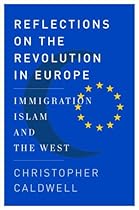 Walter Laqueur :: Christopher Caldwell is a columnist of the Financial Times. There have been several dozen books in various languages about the political, cultural, and social changes taking place in Europe (and about to occur in the years to come), but Caldwell’s Reflections on the Revolution in Europe: Immigration, Islam, and the West (Doubleday, 2009) is still useful, based on wide reading and shrewd observation. This levelheaded book has its weaknesses, it is far better informed about European reactions to Muslim immigration than on European Islam and the differences within Muslim communities and between various countries. But it still deserves to be read in view of the great resistance in Europe to accept the fact that important changes have taken place, and confusion over what to do about it.
Walter Laqueur :: Christopher Caldwell is a columnist of the Financial Times. There have been several dozen books in various languages about the political, cultural, and social changes taking place in Europe (and about to occur in the years to come), but Caldwell’s Reflections on the Revolution in Europe: Immigration, Islam, and the West (Doubleday, 2009) is still useful, based on wide reading and shrewd observation. This levelheaded book has its weaknesses, it is far better informed about European reactions to Muslim immigration than on European Islam and the differences within Muslim communities and between various countries. But it still deserves to be read in view of the great resistance in Europe to accept the fact that important changes have taken place, and confusion over what to do about it.
.
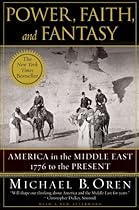 Michael Mandelbaum :: The subtitle of Michael B. Oren’s Power, Faith, and Fantasy: America in the Middle East, 1776 to the Present (Norton, 2007)—a compelling, smoothly written history based on prodigious research—announces one of its themes: the connection between the world’s strongest country and the world’s most turbulent region is an old one. It dates back, in fact, to the earliest years of the republic: the war with the Barbary pirates in the latter part of the 18th century and the outset of the 19th counts as the first war waged by the independent United States. (The war was won, but only after years of setbacks—perhaps a portent for our own time.) For their chronic naivete about the Middle East, therefore, Americans have no good excuse.
Michael Mandelbaum :: The subtitle of Michael B. Oren’s Power, Faith, and Fantasy: America in the Middle East, 1776 to the Present (Norton, 2007)—a compelling, smoothly written history based on prodigious research—announces one of its themes: the connection between the world’s strongest country and the world’s most turbulent region is an old one. It dates back, in fact, to the earliest years of the republic: the war with the Barbary pirates in the latter part of the 18th century and the outset of the 19th counts as the first war waged by the independent United States. (The war was won, but only after years of setbacks—perhaps a portent for our own time.) For their chronic naivete about the Middle East, therefore, Americans have no good excuse.
The book’s title expresses another of its principal themes. The American encounter with the region has had three distinct although overlapping sources. Power, of course, is the principal moving force of international affairs, and as the United States has grown stronger over the decades its entanglement in the Middle East, as in other parts of the world, has deepened. Because Americans have always been religiously inclined people, the Holy Land has held a special attraction for them. The commitment of American Protestants to the return of the Jews to their ancestral homeland goes back, for example, to the 18th century. And Americans have consistently held beliefs about the region based on their own wishes and hopes rather than on the realities of the societies there. If one of the bases of recent American policy in the Middle East—the belief in Arab democracy—turns out to be a fantasy, it will have a long pedigree.
One other theme from this rich account deserves mention. For religious, self-interested, and altruistic reasons Americans have tried, for more than two hundred years, to do good in the land of the Bible, the pyramids, and the mosque. More often than is commonly realized, as Oren documents, they have succeeded. The low public standing of the United States among most Middle Easterners (Israelis conspicuously excepted) for the last six decades therefore provides powerful supporting evidence for the proposition that no good deed goes unpunished.
For those interested in these three themes, and in putting the occupation of Iraq, the confrontation with Iran, and the sputtering but apparently immortal Arab-Israeli peace process in their proper historical context, Power, Faith, and Fantasy is the book to read.
.
 Joshua Muravchik :: Infidel by Ayaan Hirsi Ali (Free Press, 2007) is simply a great work of literature. How she does it, I cannot imagine since, as we learn in the book, English is apparently her sixth language, and they are disparate ones. Move over, Joseph Conrad. The prose is beautiful. The recounting of her childhood and coming of age in Somalia and other Third World venues is gripping. No less so, her flight to the West and her encounter with, and gradual assimilation of, its culture. Hirsi Ali is a significant political figure, but never mind the politics. This is a magnificent tale of human growth and triumph.
Joshua Muravchik :: Infidel by Ayaan Hirsi Ali (Free Press, 2007) is simply a great work of literature. How she does it, I cannot imagine since, as we learn in the book, English is apparently her sixth language, and they are disparate ones. Move over, Joseph Conrad. The prose is beautiful. The recounting of her childhood and coming of age in Somalia and other Third World venues is gripping. No less so, her flight to the West and her encounter with, and gradual assimilation of, its culture. Hirsi Ali is a significant political figure, but never mind the politics. This is a magnificent tale of human growth and triumph.
.
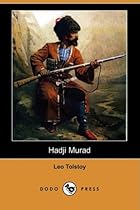 Michael Reynolds :: Summer reading and Tolstoy are mutually exclusive, but I urge readers to make an exception for Tolstoy’s Hadji Murat (Dodo Press edition, 2009), and not because Tolstoy was an Orientalist (he studied Oriental languages at Kazan University). Hadji Murat is a short and fast-paced novel set in the Great Caucasus War which Russia waged against the Avars, Chechens, Lezgis, Circassians and other mountain peoples of the North Caucasus in the 19th century. Drawing on his own experiences fighting in the Caucasus, Tolstoy illustrates an empire at war with tribal peoples.
Michael Reynolds :: Summer reading and Tolstoy are mutually exclusive, but I urge readers to make an exception for Tolstoy’s Hadji Murat (Dodo Press edition, 2009), and not because Tolstoy was an Orientalist (he studied Oriental languages at Kazan University). Hadji Murat is a short and fast-paced novel set in the Great Caucasus War which Russia waged against the Avars, Chechens, Lezgis, Circassians and other mountain peoples of the North Caucasus in the 19th century. Drawing on his own experiences fighting in the Caucasus, Tolstoy illustrates an empire at war with tribal peoples.
The novel’s namesake and central character is an Avar notable trapped between an Imperial Russian Army seeking to subdue the mountaineers and an Islamic resistance movement led by Imam Shamil, who grimly seeks to upend traditional mountaineer society in the name of religion. As a classic work of literature, Hadji Murat explores universal themes, including the dynamics that drive men to fight and sacrifice their lives. It reveals, among other things, the complexity of modern insurgencies, where bureaucracies clash with clan structures, trust is impossible, and religious, ethnic, and family ties all compete for the loyalties of individuals, with often fatal consequences.
.
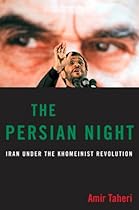 Philip Carl Salzman :: Amir Taheri, executive editor-in-chief of Iran’s Kayhan newspaper prior to the “Islamic revolution,” and now living in the West, is an unalloyed opponent of the Islamic Republic of Iran. The Persian Night: Iran Under the Khomeinist Revolution (Encounter Books, 2009), written for a popular audience in clear prose, doesn’t mince words in its rejection of the current regime. The Islamic Republic’s claims to Islamic purity are debunked; its insistence on world conquest exposed; and its brutality to its own people denounced. Taheri cites widespread internal clerical opposition to the regime, including quotes from ayatollahs that the Islamic Republic is “a conspiracy against God and believers,” and “the rule of the corrupt, by the corrupt, for the corrupt.” The entire sordid history of the Islamic Republic is recounted in detail and assessed. Taheri makes a strong case that the Iranian people deserve better. In sum, a lively read by a knowledgeable partisan.
Philip Carl Salzman :: Amir Taheri, executive editor-in-chief of Iran’s Kayhan newspaper prior to the “Islamic revolution,” and now living in the West, is an unalloyed opponent of the Islamic Republic of Iran. The Persian Night: Iran Under the Khomeinist Revolution (Encounter Books, 2009), written for a popular audience in clear prose, doesn’t mince words in its rejection of the current regime. The Islamic Republic’s claims to Islamic purity are debunked; its insistence on world conquest exposed; and its brutality to its own people denounced. Taheri cites widespread internal clerical opposition to the regime, including quotes from ayatollahs that the Islamic Republic is “a conspiracy against God and believers,” and “the rule of the corrupt, by the corrupt, for the corrupt.” The entire sordid history of the Islamic Republic is recounted in detail and assessed. Taheri makes a strong case that the Iranian people deserve better. In sum, a lively read by a knowledgeable partisan.
.
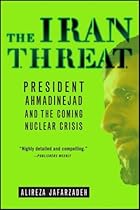 Raymond Tanter :: Alireza Jafarzadeh’s The Iran Threat: President Ahmadinejad and the Coming Nuclear Crisis (Palgrave Macmillan, 2007) charts a unique path among commentary on Iran by directly linking the Iranian regime’s ideology with its quest for nuclear weapons. Jafarzadeh’s knowledge of Iran’s nuclear program is expansive: In August 2002, as spokesman for the National Council of Resistance of Iran, he revealed the existence of the Natanz uranium enrichment facility, where the Iranian regime had clandestinely built cavernous centrifuge enrichment halls. In The Iran Threat, Jafarzadeh examines the rise of President Ahmadinejad and the corresponding Islamic Revolutionary Guards Corps (IRGC) control of Iran’s nuclear program. As the IRGC and its clerical ally Ayatollah Khamenei consolidate power following the fraudulent re-election of Ahmadinejad in June, it is worth revisiting Jafarzadeh’s incisive work on the Iranian president’s background and the ideology that underpins his domestic and international policies.
Raymond Tanter :: Alireza Jafarzadeh’s The Iran Threat: President Ahmadinejad and the Coming Nuclear Crisis (Palgrave Macmillan, 2007) charts a unique path among commentary on Iran by directly linking the Iranian regime’s ideology with its quest for nuclear weapons. Jafarzadeh’s knowledge of Iran’s nuclear program is expansive: In August 2002, as spokesman for the National Council of Resistance of Iran, he revealed the existence of the Natanz uranium enrichment facility, where the Iranian regime had clandestinely built cavernous centrifuge enrichment halls. In The Iran Threat, Jafarzadeh examines the rise of President Ahmadinejad and the corresponding Islamic Revolutionary Guards Corps (IRGC) control of Iran’s nuclear program. As the IRGC and its clerical ally Ayatollah Khamenei consolidate power following the fraudulent re-election of Ahmadinejad in June, it is worth revisiting Jafarzadeh’s incisive work on the Iranian president’s background and the ideology that underpins his domestic and international policies.
 Posts+Comments
Posts+Comments Posts+Comments
Posts+Comments Posts+Comments
Posts+Comments Posts+Comments
Posts+Comments